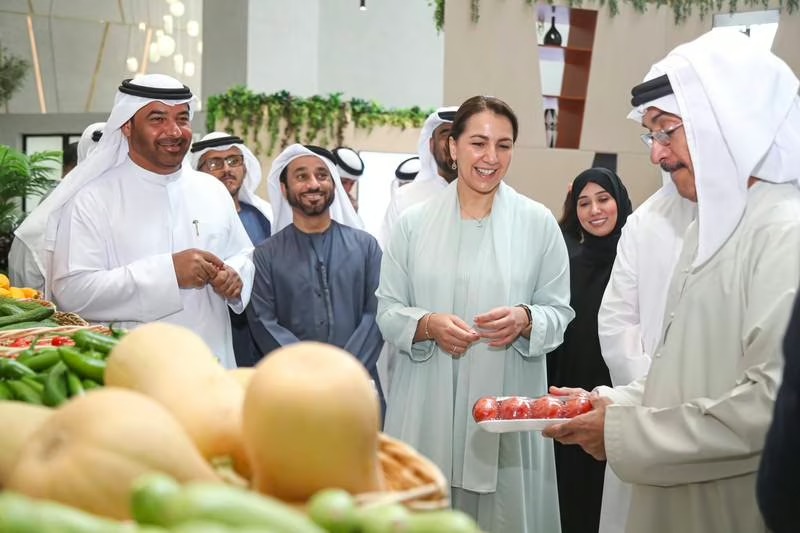UAE Sets Strategy for Expanding Local Food Production and Consumption
- March 22, 2023
- FMCG HORECA BUSINESS

Salmon aquaculture on land, Fitbit-like gadgets for livestock, and acres of greenhouses growing vegetables in a Mediterranean climate – the face of agriculture in the UAE is undergoing rapid transformation.
With a predicted 70 percent rise in global food consumption by 2050 and the impact of climate change on agricultural productivity, innovation is the key to alleviating food insecurity.
A campaign launched by the Ministry of Climate Change and Environment seeks to bring together firms with innovative solutions and financing to combat these concerns.
Local farms are at the centre of the National Dialogue for Food Security, and they will be encouraged to become key suppliers in the UAE in an effort to minimise dependency on imported products.
The project will build a platform for emerging innovation in food production in order to increase the use of hydroponic, aeroponic, and aquaponic farming, which utilises little resources to generate a high output of fresh fruits and vegetables while also offering access to the mass market.
The initiative intends to promote domestic production and self-sufficiency of certain food commodities, as well as raise farm incomes in the UAE without sacrificing food commerce.
According to the plan, organisations will expand their procurement of fresh national food items to 50% by the end of this year, 70% by 2025, and 100% by 2030.
In the first phase, the following food items and plant kinds were identified: red meat, chicken, eggs and other dairy products, dates, green vegetables, tomatoes, cucumbers, peppers, and aubergine. Currently, a research is being done to find other goods for the second phase.
Recent worldwide crises, according to Mariam Al Mheiri, Minister of Climate Change and Environment and Minister of State for Food Security, have highlighted the need to promote food security in the UAE.
"To promote food security, the UAE has taken strategic measures, such as deploying advanced technology to strengthen the local food production sector, increasing its contribution to closing the food gap, and combating food loss and waste by launching several initiatives, such as Ne'ma, to promote the sustainability of national farms," she explained.
These programmes attempt to improve food security in the United Arab Emirates by increasing the production and marketing efficiency of local farms, especially those that use a contemporary and sustainable strategy.
Ne'ma (Arabic: ) is a programme designed to reduce food loss and waste by promoting ethical eating.
On Monday, at a meeting to examine recent events, it was reported that a farm in Maliha, Sharjah, had produced more than 15,000 tonnes of wheat with added protein.
It is the most recent example of sustainable staple food production in the UAE.
By 2050, the global population is projected to reach 9.5 billion, with climate change continuing to create severe weather events and drought, which have a significant influence on food supply.
With diminishing freshwater supplies, scientists have resorted to creativity to overcome these worldwide problems.
Recent estimates from the Ministry of Climate Change and Environment indicate that there are 38,000 farms operating in the UAE.
yearly vegetable output in the UAE is around 156,000 tonnes, including more than 500 tonnes of field crops and feed, while yearly fruit production is over 200,000 tonnes.
Currently, domestic vegetable production fulfils more than twenty percent of the nation's overall need.
Precision agriculture, which utilises data science and agricultural engineering, has enhanced crop yields, while high-tech greenhouses and vertical farms reduce the demand for water.
In animal agriculture, gene editing, bioengineering, and smart technology are being used to enhance meat output in order to meet customer demand and narrow the food price gap.
Alternative proteins generated from non-animal sources, such as insects and plant-based meats, are anticipated to increase in popularity.
Agriculture innovation
Known as rumination collars, health trackers worn by dairy cattle monitor their health and food intake, enabling farm managers to control a big herd with more efficiency.
Salmon farming on land, which uses enormous tanks to reproduce the fish's life cycle in the wild, is a prevalent invention in the United States today.
Under the UAE's Food Security Strategy for 2018, fish has been designated as a strategic food item.
According to the UN Food and Agriculture Organisation, it has one of the highest per capita fish consumptions in the GCC, at roughly 30kg.
In 2019, just 8% of UAE consumption was comprised of domestic fish, but this is starting to change as aquacultured salmon regulated in freshwater tanks (which are transported to saltwater as they mature) proves to be an economical and sustainable way of production.
With the addition of these revolutionary agricultural techniques, the cultivation of fruits and vegetables in dry deserts has become one of the most remarkable success stories.
In Al Ain, Pure Harvest Smart Farms has established the ideal Mediterranean environment in enormous temperature-controlled agricultural tunnels and domes to produce astounding amounts of fruit and vegetables.
When temperatures are controlled between 14°C to 32°C, tomatoes, green leafy vegetables, and berries may be grown with just a thirtieth of the water normally needed.
"This demonstrates what is possible," said Sky Kurtz, chief executive officer of Pure Harvest, a smart farm that produces around 18 metric tonnes of food every week.
"Change [in the manner in which we produce food] will need investment and retraining.
Many of the UAE's food requirements might be sourced locally in a manner that is sustainable, economically viable, and ecologically friendly.
The United Arab Emirates (UAE) believes that by the end of this year, local farmers and producers will be able to provide 50 percent of basic food needs, such as leafy greens, tomatoes, pork, and chicken, with the aim of doubling that goal by 2030.
Mr. Kurtz said that a coordinated effort between the government and the corporate sector would be required.
"Many of the technology-enabled food production options required for year-round food production in the UAE need cash, scale, and expertise to implement.
"The more the government can do to support the numerous elements that underpin the core business cases of these solutions, the better."











